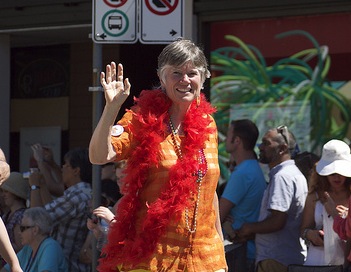In June Russia, host of the 2014 Sochi Winter Olympics, passed a federal law which will seriously impact the rights of Russians, all Olympic athletes, staff, volunteers and foreigners who are LGTTBQ (Lesbian, Gay, Transgendered, Two Spirited, Bisexual, Queer).
This has led to a call for a boycott of the Olympics. Calls for boycotts of the Olympics are not new tactics as a way to protest.
Historically, some have come due to violations of human rights within the host countries, such as at the 1936 Olympics in Nazi Germany. Others have targeted host cities, such as the issues raised during the Vancouver Olympics to protest the enormous cost to host the Games at a time when there was a need for public money for housing the homeless, education, poverty, funding for sports at a local level etc, as well as human rights concerns regarding signs, protest, and the use of cameras by the police. Other calls to protest have come because of violations by the International Olympic Committee (IOC), most recently the refusal to let women participate in ski jumping.
The public has the right to raise these issues as millions of dollars of taxpayers’ money go to fund the Olympics and end up in the pockets of the IOC, developers, large sponsoring corporations like Coca-Cola and the media. Very, very small amounts go to the athletes, who often have devoted their lives to reaching the top of their sport.
Many countries can’t even afford to send athletes, let alone train them in the latest techniques which would enable them to win. Most countries don’t fund, train or ensure half their athletes are women. Worldwide, including in Canada, the overwhelming majority LGTTBQ athletes who want to participate make sure that nobody knows they are queer for fear of homophobia. These issues are much larger than Sochi. A former Canadian athlete, activist and renown sports journalist Laura Robinson says, “cities and countries that are bidding to host any kind of big sporting event must meet human-rights criteria.”
The LGTTBQ community has slowly and successfully been building a strong social movement and a body of human rights legislation. However the IOC, which includes gender and race in its policy, does not include “sexual orientation.” In countries like Canada we have human right policies to protect LGTTBQ but not yet the transgendered community at all levels of government.
At the 2010 Vancouver Winter Olympics, because of the strength of the queer movement, two out elected queer Councillors, a supportive City Council, queer policy and an LGTTBQ Advisory Council, we were able to have an official Pride House with counselors to assist foreign queer visitors. As a City Councillor I was able to write up and insert a full page on LGTTBQ rights and activities in the official Vancouver City package which was given to guests and was also online.
Given Canadian human rights policy, why haven’t the Canadian Olympic Committee, the Prime Minister and the House of Commons taken a much stronger public stand confronting both the IOC and the Russian government? Eighty-three Members of the U.S. Congress are urging the U.S. to ensure the safety of their athletes.
Calls for a boycott are not supported by the queer community in Russia or by Olympic athletes. As Mary Woo Sims, former B.C. Chief of the Human Rights Commission says:
“I think it is unfair to place pressure on the athletes to boycott the Sochi Olympics. I remember how my sister and my family felt when Hong Kong, as a British Colony boycotted the Moscow Summer Olympics. She had trained and competed hard to represent Hong Kong and our family saved and sacrificed to support and be there for her. Frankly, the pressure should be on the IOC to consider the human rights record of a country before awarding any games to it. And to be bold and prepare to withdraw the Games from a country that subsequent to being awarded the games, oppresses and violates the human rights of its community. In the meantime, corporate sponsors should be contacted to withdraw sponsorship. Economic pressure should not just be directed at Russian vodka companies, it should also be directed at multinational corporations who are sponsoring the Sochi Olympics.”
The LGTTBQ movement in Russia, athletes around the world and others echo her comments. They feel that the Games should go on in Sochi and that the public outcry against homophobia in Russia can strengthen the situation of queers in Russia as well as raise the rights of queers internationally. They think that a boycott could lead to even further repression of queers within Russia. They are saying “use the games to speak out, but don’t walk out.”
We all remember the Mexican Olympics and the powerful and courageous black athletes Tommie Smith and John Carlos who raised their fists. Anyone who attends could wear a rainbow flag, talk about human rights and hold hands in solidarity.
Protests currently underway are the boycott of Russian vodka, but many say this is not enough since sponsors of the Olympics such as Coca-Cola, Panasonic, VISA, Samsung, and Procter & Gamble should also be forced to stand up publicly against homophobia. People are urged to contribute financial support to Russian LGTTBQ organizations.
NBC (the television network covering the 2014 Winter Olympics) is being petitioned to have an openly lesbian MSNBC news anchor cover the games as a human rights correspondent. Others are calling for all attending the games to show the rainbow flag.
Human rights are fragile. Homophobia is very powerful and must be fought against by all — locally and internationally.
The whole world is watching the IOC and Russia. We are calling on all countries to stand up loud and proud for LGTTBQ rights.
Ellen Woodsworth is a former Vancouver City Councillor.
Photo: brent_granby / flickr




